Spotlight
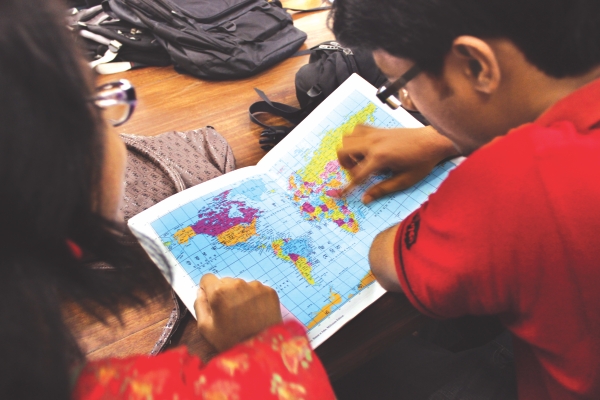
To know the world better: Studying IR in Dhaka University
Rakibul Hasan
Photol: Kazi Tahsin Agaz Apurbo
Mithila, along with her friends, Partha and Shymol, are seen discussing news items from newspapers they are reading together. “Hey did you see the sports section today? Mushfiqur Rahim has become the new captain of the Bangladesh team,” remarks Shyamol. However, Partha seems least interested in the topic and adds, “Look! It says here that a new version of the iphone will come out soon." The ever-sombre yet resilient Mithila, student of the Department of International Relations, University of Dhaka, barges in and says, “Do you know that Bangladesh has to participate in the hearing of the case concerning delimitation of maritime boundary at the International Tribunal on the Law of the Sea this week?" And there is silence, until everyone in the room bursts into squeals of laughter. “Dude! Who cares?” screams one of the students around.
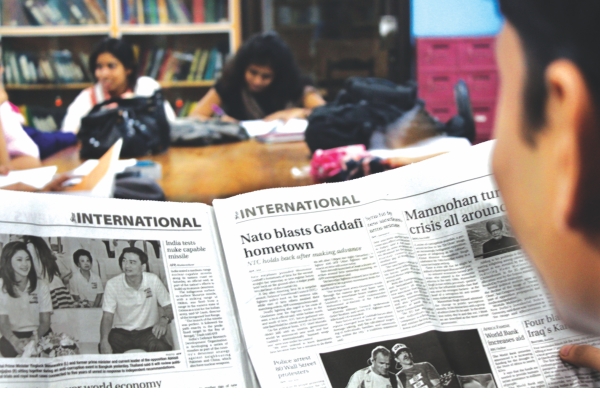 |
| IR students update themselves regularly on contemporary global issues from print and electronic media. |
Such are the reactions that students of the Department of International Relations, University of Dhaka sometimes get from their friends from different fields. At the cost of being introduced as 'nerds' to their friends, they have to update themselves regularly with the strategically important issues taking place at different parts of the globe as a part of their curriculum. Even though many youngsters stay indifferent towards issues of national and international politics, in this age of globalisation and internationalisation, it would be unwise to be oblivious about what is going on around the world. The events that occur between and within states can affect an individual's life in many ways. A rise in the price of crude oil by an oil producing country can eventually result in soaring up of prices in vegetables in the local markets of Bangladesh. As a result, we can see how important it is to stay informed about the issues that change the dynamics of world politics and interstate relations every day. Here comes the significance of studying International Relations as a separate academic discipline, which deals with the study of interactions among states and non-state actors at different levels of analysis.
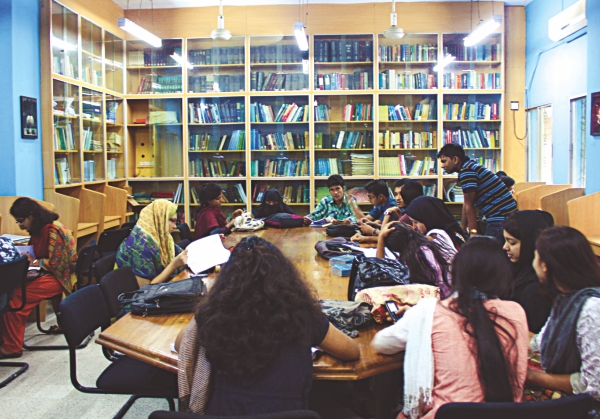 |
| IR students update themselves regularly on contemporary global issues from print and electronic media. |
The Department of International Relations (IR) at University of Dhaka (DU), as the pioneering school of International Relations in South Asia, is playing a leading role both at home and abroad, by providing quality education and research on a wide range of issues of strategic importance. The courses taught and studied at the department involve the fields of security, diplomacy, foreign policy, governance, international development, and multilateral cooperation. The Department was established in the year 1947 as the first of its kind in South Asia, with a view to developing skilled personnel primarily for diplomatic, political and international administrative and business services. The academic programmes imparted at the department are divided into Undergraduate, Post-graduate, Masters of Philosophy, Philosophy of Doctorate, and Post Graduate Diploma degrees. The course structure is designed to offer eight semesters (four years) to obtain a Bachelors degree in Social Science in the undergraduate level while two semesters (one year) to obtain a Masters degree in Social Science in the post graduate level.
 |
| Students get to know about recent issues from all over the world through the internet. |
Besides updating oneself on global issues from the print and electronic media, the tasks of an IR student also involve building a critical view of the problems based on the theoretical knowledge which they achieve by going through books, academic journals, assignments and research work. “I follow the news and events that moves and shakes the world regularly," says Monjima Haque, a Masters student at the department. "However as an IR student, I try to develop critical views of the events by cross matching them with my theoretical knowledge. In addition to that, I would also like to gain an in-depth knowledge about events by going through critical articles from different sources like academic journals on strategic issues and the internet. Though, how an individual relates a particular theory to an event may vary from person to person, one has to possess the academic background to assess an issue of national, regional or international concern. As a result the study of International Relations is very important."
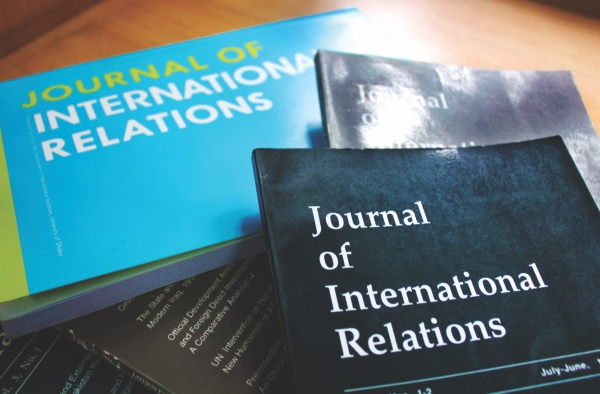 |
The department publishes a Journal of International Relations bi-annually where professionals
from different fields can articulate their perceptions and discoveries. |
In view of the fact that Bangladesh is going through a crucial time where the country has to resolve important bilateral and multilateral problems with foreign countries like sharing the water of common rivers with neighbouring countries or delimitation of maritime boundary, the Department of IR at DU has a very important role to play for creating able negotiators and providing explanations and alternatives to the country's foreign policy decisions. Commenting on the area of expertise of the IR students, A S M Ali Ashraf, an Assistant Professor of the Department, says, “The students of the IR department are holding the leading positions in services related to diplomacy, academia, think tanks and so on. Historically, IR students have proved to be more successful in diplomatic services. Here, students are trained to learn key negotiation skills so that they can emerge as able diplomats of the country in the future.”
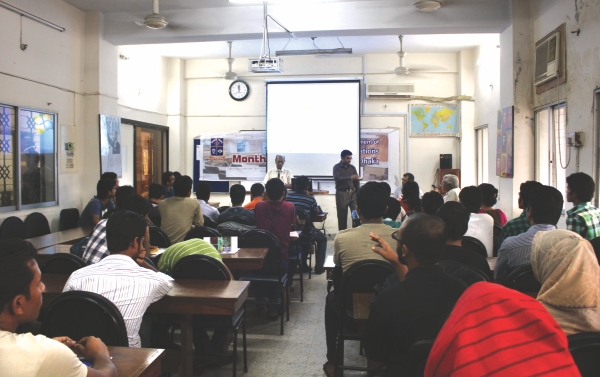 |
The department organises seminars and workshops to sensitise the public
on issues of national and global interest. |
As a specialised institution, the Department of IR at DU is responsible with the duty of creating new insights and suggestions on foreign policy decision making. The Department has a large and academically diverse research oriented faculty that believes in the interaction between faculty and students and this is reflected in the activities organised by the department. This belief in interdependence encourage the students and faculties to conduct research on different issues of strategic interests and to publish them in academic journals and papers. Presently the department publishes one bi-annual Journal of International Relations where professionals from different fields can articulate their perceptions and discoveries. Soon the department is going to publish a student's journal namely 'The Nation' of which the editorial board would consist of students. To sensitise the public about contemporary international issues, the department organises seminars and workshops where academics and stakeholders from both home and abroad participate and deliver lectures.
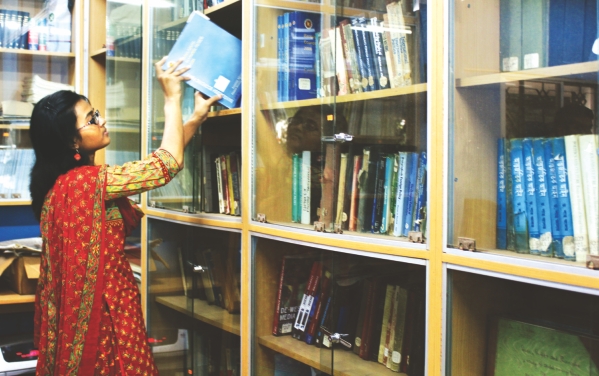 |
The department organises seminars and workshops to sensitise the public
on issues of national and global interest. |
 |
| IR Students boast a curious mind to understand
the world affairs better.
COURTESY: DEPARTMENT OF IR, DU |
Despite being an echelon of specialised education, the Department of IR is subject to limitations which are very common in public universities, namely, a lack of sufficient number of computers and inadequate application of modern technology in the teaching process. However, to improvise the situation, currently a special project named 'Higher education quality enhancement project' supported by the University Grants Commission (UGC) is being implemented by the current chairperson of the department, Dr Delwar Hossain, which is expected to facilitate students with enough resources and ensure the appropriate physical and academic fabric of the department. Sheikh Shams Morsalin, a department Lecturer says, “Over the years, the facilities for students have improved to a large extent. The use of multimedia during class lectures has made the classes more interactive. Presently we are observing a growing interest amongst the students to study in this department as the potentials of promising career opportunities in the field of IR have increased."
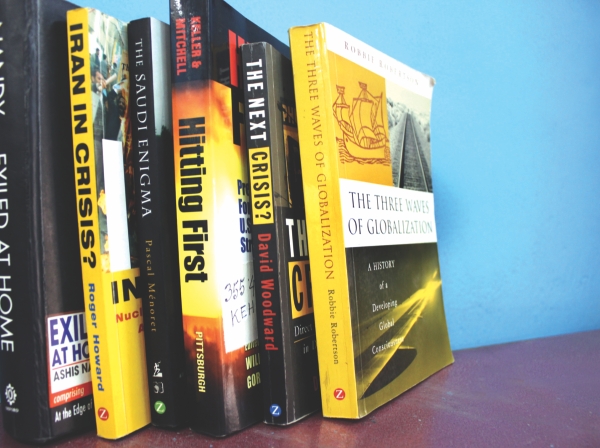 |
Courses taught and studied at the department are diverse in nature. |
With a revolution in information technology, the intensity of contacts among countries in the world has been enhanced in an unprecedented way. Today we live in an interdependent world where our society, politics and economy are all linked regionally and globally with other countries. In the face of such an increasing rate of interactions among the states of the world, the Department of International Relations at Dhaka University, strives to yield a group of people who successfully understands the complexities of interstate relations and can resolve problems in favour of their country through ace diplomacy and negotiation.
Facing Challenges
Conversation with Dr Delwar Hossain, Professor and Chairman, Department of International Relations, University of Dhaka.
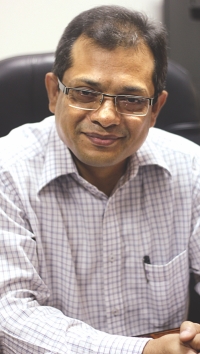 Star Campus (SC): Do you find your students to be well-informed about contemporary international issues? Star Campus (SC): Do you find your students to be well-informed about contemporary international issues?
Delwar Hossain (DH): The students of the IR department update themselves regularly, with current issues and happenings around the world. As an institution liable for providing understandings on international relations, we, as teachers, try to make our students more knowledgeable about the actions of certain state and non state actors who influence the international system.
SC: How do the courses taught at the department help students to become better negotiators on issues of state interest?
DH: We deal with issues where diplomacy and negotiation play a major role. I believe the way we have designed our academia and curriculum help the students a lot to learn about the key skills of diplomacy. However, it is up to the individual diplomats and organisations to interpret these skills properly.
SC: Do you think that there should be more participation from the IR students and faculties in our policy making level to ensure effective foreign policy decisions?
DH: To make an effective policy, mere information like facts and figures are not enough as successful implementation of a policy involve thorough discussions from both academic and practical points of views. Unfortunately, in our country the policy making level is heavily dependent on bureaucracy so there has not been enough participation from the academia. If we could develop this area it would result in effective implementation of those policies.
|
|
|
